China Arts & Entertainment
Chunwan 2022: The CMG Spring Festival Gala Liveblog by What’s on Weibo
Published
2 years agoon

PREMIUM CONTENT
As we are leaving the Year of the Ox and entering Year of the Tiger, it’s time for the 40th edition of the Spring Festival Gala! Watch the Gala together with What’s on Weibo here and follow our liveblog to keep up with what’s happening on screen and on social media (this liveblog has now closed, read the overview below!) [Premium content]
Another year has flown by and despite many changes, we can always count on China’s annual Spring Festival Gala. This 40th edition of the festival is the third one to take place in the Covid era.
The Gala will be broadcast on TV and live-streamed via various channels on January 31st, 20.00 pm China Standard Time. So turn on your TV and tune into CCTV, live stream from Weibo, watch on YouTube, or head to the CCTV website. We will be live-blogging on this page here and you can scroll & watch at the same time from this page.
Very Brief Introduction to the Spring Festival Gala
China’s Spring Festival Gala (中国中央电视台春节联欢晚会), commonly abbreviated to chūnwǎn (春晚), is the annual TV gala celebrating the start of the new year. Broadcasted since 1983, it is not just the biggest live televised event in China, it is even among the most-watched shows in the world. The show reached a record 1.27 billion viewers around the globe in 2021.
Previously known as the ‘CCTV Gala,’ it is officially presented as the ‘CMG Spring Festival Gala’ since 2020: it is hosted by China Media Group (CMG), the predominant state media company founded in 2018 that holds China Central Television, China National Radio, and China Radio International.
The Gala is an important Chinese media moment and significant cultural event organized and produced by the state-run broadcaster, overseen by the National Radio and Television Administration (NRTA), and aired across dozens of channels. It shows the very best of China’s mainstream entertainment and Party propaganda and is a mix of traditional culture, (digital) commerce, and politics. It is an opportunity for the Party to communicate official ideology, it is also a chance to present the nation’s top performers.1
Since recent years, it has also become a platform to showcase China’s innovative digital technologies. In 2015 the show first featured the exchange of virtual hongbao, red envelopes with money, which WeChat users could obtain while shaking their phones during specific moments in the show. Such marketing strategies have drawn in much younger viewer audiences than before. In 2021, the Gala explicitly presented itself as a “tech innovation event” by using 8K ultra high-tech definition video and AI+VR studio technologies and super high definition cloud communication technology to coordinate performances on stage.
The show lasts a total of four hours, from 8pm to 1am Beijing time, and usually has around 30-40 different acts, from dance to singing and acrobatics. The acts that are both most-loved and most-dreaded are the comic sketches (小品) and crosstalk (相声); they are usually the funniest, but also convey the most political messages.
As viewer ratings of the Gala in the 21st century have skyrocketed, so has the critique on the show – which seems to be growing year on year. According to many viewers, the spectacle generally is often “way too political” with its display of communist nostalgia, including the performance of different revolutionary songs such as “Without the Communist Party, There is No New China” (没有共产党就没有新中国).
For this same reason, the sentence “There’ll never be a worst, just worse than last year” (“央视春晚,没有最烂,只有更烂”) has become a well-known idiom connected to the Gala.
If you want to know more about the previous editions, we also live-blogged
– 2021: The Chunwan Liveblog: Watching the 2021 CMG Spring Festival Gala
– 2020: CCTV New Year’s Gala 2020
– 2019: The CCTV Spring Festival Gala 2019 Live Blog
– 2018: CCTV Spring Festival Gala 2018 (Live Blog)
– 2017: CCTV New Year’s Gala 2017 Live Blog
– 2016: CCTV’s New Year’s Gala 2016 Liveblog
Liveblog CMG Spring Festival Gala 2022
Underneath here you will see our liveblog being updated. Leave the page open and you’ll see the new posts coming in, there should be a ‘ping’ too with every update.
Update: this liveblog is now closed, check below for an overview of the entire show.
——–
The original liveblog was done via a third-party app. The original texts and images are copied below for reference. If there are links to particular segments of the show, they have been added later. The timestamp (in Beijing time) refers to the last moment that post was updated.
Want to directly check out some Spring Festival Gala highlights on YouTube?
We recommend:
The ‘painting’ dance: ‘Only This Green (只此青绿)
The dancing elephant song: ‘The Herd Returns With Spring’ (万象回春)
Creative music, dance, poetry, and painting: “Reminiscence of the South” (忆江南)
Tai Chi up in the sky: ‘Flowing Water’ (行云流水)
The space-themed children performance: ‘Star Dreams’ (星星梦)
——–
What can we expect?
Jan 31 19:30
It’s almost time for the 40th edition of the Spring Festival Gala to begin. The fifth and final rehearsal of the entire event took place on January 29th. Even if something goes wrong tonight, the tape of the official rehearsal runs together with the live broadcast, so that in the event of a problem or disruption, the producers can seamlessly switch to the taped version without TV audiences noticing anything.
The Spring Festival Gala usually always focuses on the themes that matter to Chinese authorities, as the event is an important moment to communicate official ideology.
The themes and topics that mattered last year were China’s battle against COVID19, the 100th anniversary of the Chinese Communist Party, China’s eradication of poverty, China’s Space Program, and the upcoming Winter Olympics.
This year most of these themes will probably again also play an important role this year, together with rural revitalization and China’s unity, with a special focus on Taiwan and Hong Kong.
Also, we’re pretty sure that Olympic mascots Bing Duan Duan (“Bing Dwen Dwen”) and Xue Rong Rong (“Shuey Rhon Rhon”) will show up.
——–
Less Focus on Celebrity Culture
Jan 31 19:35
After a year of celebrities being canceled and crackdowns shaking the Chinese entertainment industry to the core, this year’s Spring Festival Gala will be less focused on popular idols of the internet era and more focused on performing art talents and national heroes.
Chinese state outlet Global Times stressed the idea that those performing in the Chinese New Year Gala should “act as a role model to viewers.”
Many of the people who have an impeccable track record are the older performing artists (those who never had to deal with the social media audiences), so the average age of the artists tonight might be a bit higher up the age ladder than usual.
——–
Most Anticipated Acts?
Jan 31 19:50
One of the most anticipated acts for tonight is the dance play “Only This Green” (只此青绿) inspired by the famous handscroll “One Thousand Miles of Rivers and Mountains.” In this performance, choreography twin stars Zhou Liya and Han Zhen will highlight the aesthetics of traditional Chinese painting.
The performance of the official Winter Olympics theme song is also attracting some attention.
Overall, the schedule of tonight’s show is looking fairly traditional, although there will be plenty of tech on display too; a 720-degree dome made of LED screens is set up for an immersive viewing experience, and the latest technology like AR, XR, and 8K will also be used.
——–
Liu Zhen: Chief Director
Jan 31 19:57
This year’s director of the Spring Festival Gala is Liu Zhen (刘真), who is the Deputy Director of the CCTV arts channel. He is known for previously directing the 2009 anniversary night of the Great Sichuan earthquake and he also directed the 2019 Spring Festival Gala themed around “New China.”
Noteworthy enough, it seems that this year’s Gala is only broadcasted from CCTV 1 Beijing Studio. Usually, there are also three or four other sub venues in other parts of China. Perhaps the Covid19 situation has been a contributing factor to deciding to let this year’s show only take place in one location.
——–
We’re starting!
Jan 31 20:05
In this opening act, Happy and Auspicious Year (欢乐吉祥年), three major Wuhan art groups are on stage together with many familiar faces, including the 87-year old actress Tao Yuling, we just saw Chinese director Zhang Yimou and acclaimed actor Ge You appearing in the intro, and there are many others together with some veteran performers who are being honored on stage today.
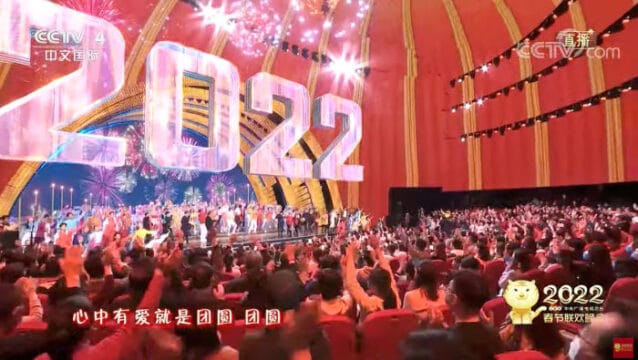
——–
Tonight’s hosts
Jan 31 20:06
These are tonight’s hosts:
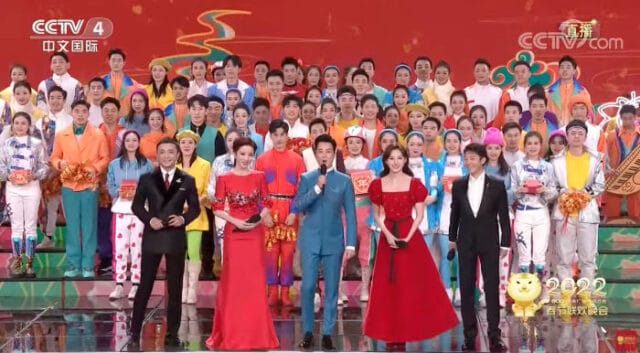
Ren Luyu (任鲁豫, 1978): Ren Luyu is a famous Chinese television host from Henan who is a very familiar face for viewers. He presented the Gala five times since 2010.
Li Sisi (李思思, 1986): Li Sisi is a Chinese television host and media personality who is actually most known for her role as host of the Gala since 2012. This is the fifth time Li Sisi is presenting the Gala. She used to be the youngest host, but this year, Ma Fanshu is taking her place as the youngest host.
Nëghmet Raxman (尼格买, 1983): Together with Ren Luyu, Raxman is known as one of the veteran Gala hosts of the past decade. This is the seventh time for him to present the event since 2015. Nëghmet Raxman is a Chinese television host, born and raised in Ürümqi, Xinjiang.
Sa Beining (撒贝宁, 1976): Also known as Benny Sa, SA Beining previously presented the Gala in 2012, 2013, 2015, and 2016. He is a Chinese television host known for his work for CCTV.
Ma Fanshu (马凡舒, 1993): Ma Fanshu is the youngest and newest host in this year’s Gala. She is a sports program host who has also been called “the most beautiful host of CCTV.”
It’s noteworthy that renowned CCTV host Zhu Jun still has not returned to the Gala. The presenter was accused of sexually assaulting an intern in 2018 and hasn’t been a host at the Gala since. Although the internet lost the sexual harassment lawsuit against Zhu Jun, he still hasn’t reappeared.
——–
Sense of the Times 时代感
Jan 31 20:10
This song is performed by the Chinese actor and singer Deng Chao (邓超) together with China’s ‘Supergirl’ Li Yuchun (李宇春) and Yi Yang Qianxi (Jackson Yee), the youngest member of the Chinese boy band TFBoys and super popular solo artist.
On stage, we also see dancer Zhang Yin (张引) together with various dance troupes.
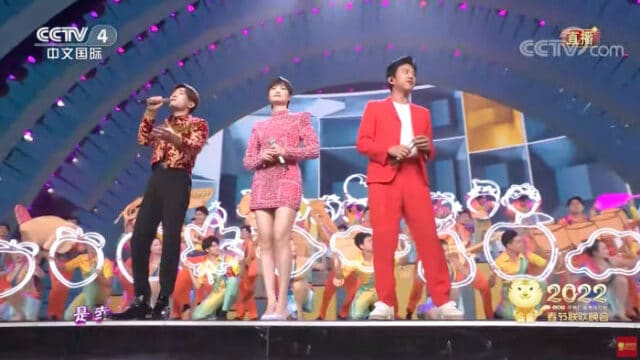
Tonight we’ll see other members of the TFBoys come up in other acts as solo artists rather than as a group.
Link to this performance here.
——–
Skit: Father and Son
Jan 31 20:15
This is the first sketch comedy or short play of the night, called xiaopin 小品 in Chinese. Traditionally, the xiaopin is the best-received type of performance of the Gala for evoking laughter among the audiences. The various xiaopin shows are filled with puns, funny lines, and plot twists to entertain the viewers.
Over recent years, these comic acts performed during the Spring Festival Gala have come to center more on social issues such as environmental protection, corruption, social morals, migrant workers, and family affairs – including those concerning love and marriage. These are not always appreciated as much by viewers.

Meanwhile, on Chinese social media, some netizens are wondering who this kid is who was on stage earlier because he seemed a bit uncomfortable and awkward. But wouldn’t you too?! Over a billion people are watching this show!
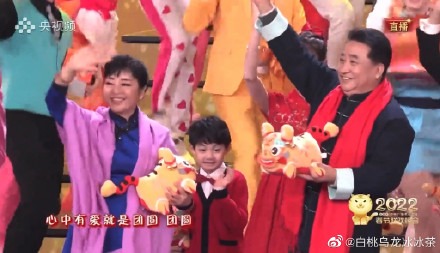
Link to this performance here.
——–
The ‘Awkward Kid’
Jan 31 20:20
Look son, you’re a meme now!
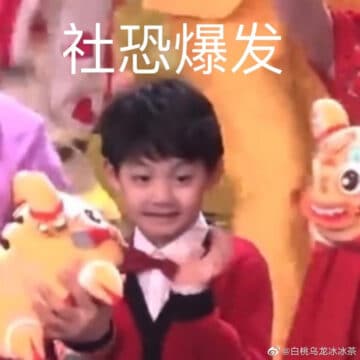
——–
Pressured by the Parents
Jan 31 20:25
Inevitably, this skit touches upon the issue of Chinese parents pressuring their kids to settle down and have kids. This is already leading to online discussions as viewers often think the Gala has skits that are insulting to women or just embarrassing. In this case, the grandpa can’t wait for a grandkid, he even thinks his future grandchild is already calling him from the womb!

Link to this performance here.
——–
The Herd Returns With Spring
Jan 31 20:36
After the night’s first public announcement video – which was actually very well made with the tiger jumping through all the scenes -, we are now at the next segment. This is a musical skit (音乐短剧) focused on how nature blossoms with the return of spring (万象回春). It is performed by Chinese mainland singers Sha Baoliang (沙宝亮) and Wang Li (王莉) together with dancer and singer Liu Jia (刘迦).
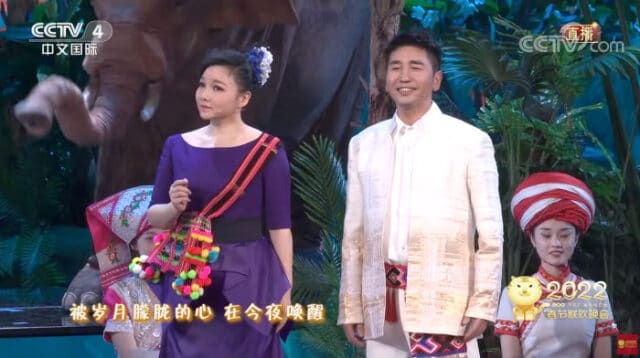
The highlight of this act is the dancing elephants. They’re not real, obviously.
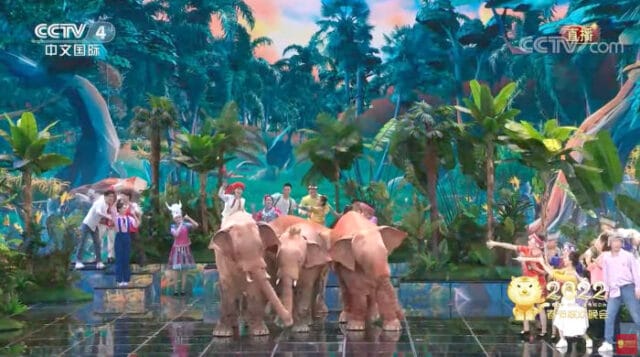
Last year, a herd of wild Asian elephants wandered hundreds of miles across southern China. They became a top trending topic on Chinese social media as netizens followed their journey. In September 2021, the elephants returned home after covering a total distance of 1,300 km.
Before tonight’s show, a creator already highlighted the elephants in the countdown program.
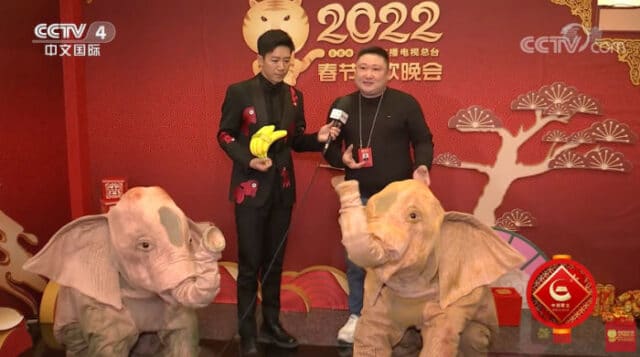
Link to this performance here.
——–
Spring Breeze
Jan 31 20:38
Chinese soprano Yin Xiumei (殷秀梅) and contemporary opera singer Yan Weiwen (阎维文) perform the song Ten Thousand Miles of Spring Wind (春风十万里), which was previously performed at the 2020 Gala by Zhang Ye (张也) and Liu Tao (刘涛).
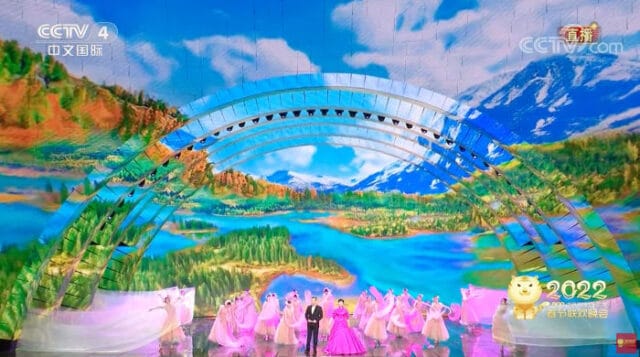
Link to this performance here.
——–
21 Weibo Accounts Suspended For ‘Ruining The Holiday Spirits’ During Lunar New Year
Jan 31 20:40
We’re seeing loads of criticism on the Gala already. Online criticism and making fun of the Gala is a big part of the ‘Chunwan Experience’ ever since the social media era. But Weibo censors might be stricter this year.
On January 22, Weibo issued an indirect warning to netizens criticizing the festive annual Chinese New Year Galas by suspending 21 Weibo users spreading negativity regarding broadcasted festival programs and their performances.
According to Weibo Management (@微博管理员), there are individual netizens who are using televised Lunar New Year celebrations to condemn and slander Chinese performers and Chinese media. In doing so, they allegedly “deliberately destruct the warm and peaceful holiday spirit.”
“In times of pandemic, the Spring Festival needs positivity and warmth,” Weibo Management stated.
——–
Comical Sketch: To Return or Not?
Jan 31 20:45
This is the sixth time for Chinese comedian Shen Teng (沈腾) and Ma Li (马丽) to be on stage together at the Spring Festival Gala. Besides that, you also might know them because Shen Teng, one of China’s top comedian actors, and the famous Ma also played together in the 2015 hit movie Goodbye Mr. Loser (夏洛特烦恼).

On stage with them are Chang Yuan (常远), Ai Lun 艾伦, Wang Chengsi (王成思) and Xu Wenhe (许文赫).
This act is about people who have the means to repay debts they owe but choose not to, also referred to as 老赖 (laolai). This guy is so cheap he even offers a drink of water from the heating system.
By the way, did you know you can even watch the Gala from WeChat? It seems there are more ways and channels to watch every year. The Gala already reached a record 1.27 billion viewers last year.

Link to this performance here.
——–
Heads Up! Only This Green (只此青绿)
Jan 31 21:04
This is a much-anticipated dance performance by Chinese star dancer Meng Qingyang (孟庆旸) together with the China Oriental Performing Arts Group. Meng also performed the dance Jasmine in last year’s Gala.
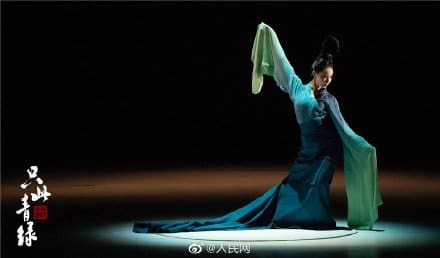
“Only This Green” (只此青绿) is inspired by the famous handscroll “One Thousand Miles of Rivers and Mountains.” In this performance, choreography twin stars Zhou Liya and Han Zhen will highlight the aesthetics of traditional Chinese painting.
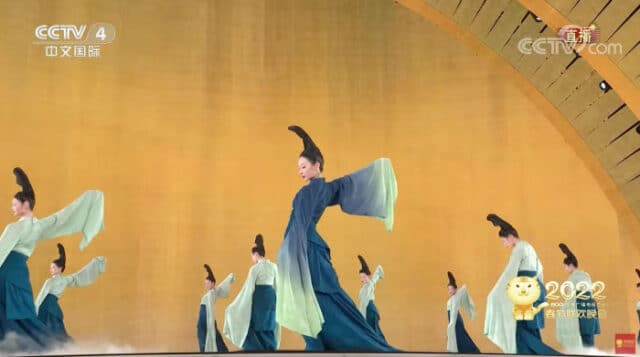
The 11.9-meter (39 ft)-long scroll A Thousand Li of Rivers and Mountains by Wang Ximeng comes from the Song Dynasty and it has been described as one of the greatest works of Chinese art. The painting is in the permanent collection of the Palace Museum in Beijing.
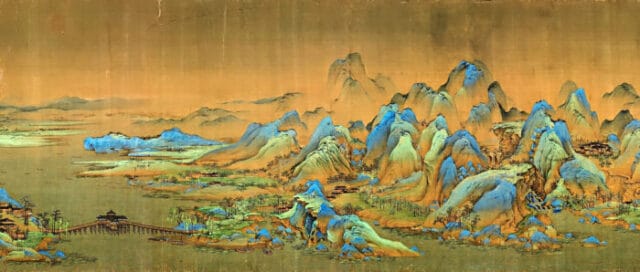
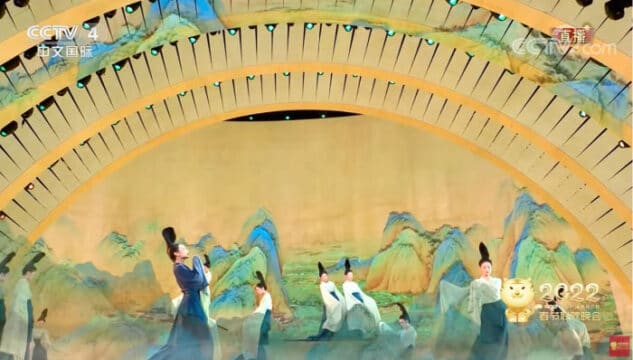
Link to this performance here.
——–
Tai Chi: “Flowing Water”
Jan 31 21:10
Chinese Olympic athlete Yang Shunhong (杨顺洪), Tai Chi World Champion Liang Bifeng (梁壁荧) and Tai Chi master Yang Dezhan (杨德战) were just featured in this impressive Tai Chi performance recorded on dazzling heights in Shanghai. (Correction > recorded from the three highest buildings in Guangzhou, Shanghai, and Chongqing!)
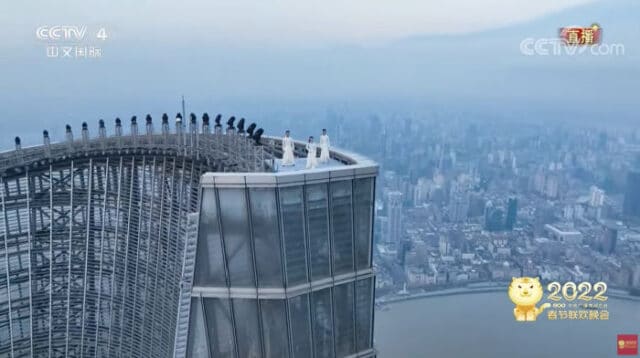

Link to video: ‘Flowing Water’ (行云流水)
——–
Chunwan Shopping
Jan 31 21:21
Over recent years, it’s become more common for e-commerce sellers to immediately jump in on the hype of what performers are wearing to sell the same or similar clothes and accessories online. In this way, viewers can watch the show while also eating and shopping, and chatting on social media at the same time!

——–
喜上加喜
Jan 31 21:23
In this comic sketch, we see Chinese comedian actress and film director Jia Ling together with award-winning actress Zhang Xiaofei. These two also worked together in the super popular 2021 movie ‘Hi, Mom‘. This time they are on stage as a mother-in-law and daughter-in-law. Since they’re both very popular, many Weibo users also said they were looking forward to seeing this sketch – especially because there was a scene in which Jia Ling, who played Zhang’s daughter in the movie, said: “Next life, let me be your mother.”

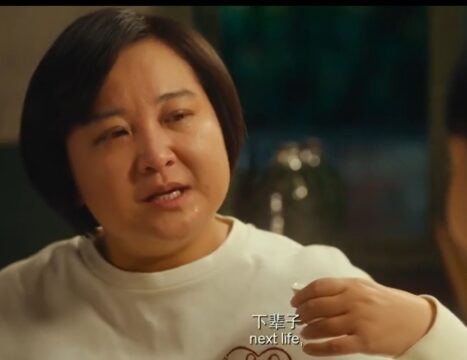
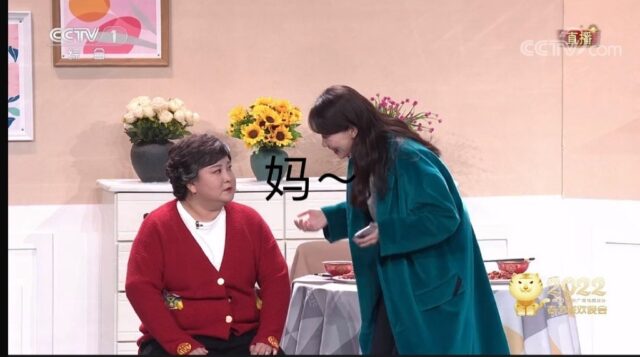
Meanwhile, some on social media are wondering if Jia is wearing the same outfit every year.

Link to this performance here.
——–
Uhm…
Jan 31 21:29
Some very quick viewers were able to capture Chinese actor Chen Baoguo (陈宝国) picking his nose with his mask on while sitting in the audience.
By the way, this is the second year the audience is wearing a face mask. In 2020, when Wuhan was first facing the Covid19 outbreak, the audience was not wearing face masks yet. 2021 was the first year.

——–
Here’s Han Hong Again
Jan 31 21:33
Singer Han Hong (1971) is one of China’s most famous pop singers and she is a regular at the Spring Festival Gala. For decades, the singer of mixed Tibetan and Han ethnicity was a member of a performing arts troupe within the People’s Liberation Army.
Tonight, she is singing the song So Many People in This World (这世界那么多人). She seemed to have some tears streaming down her face during her performance.
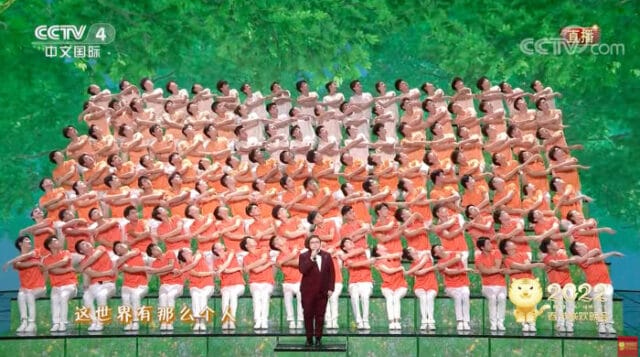

——–
Peking Opera
Jan 31 21:45
Every year you’ll see a Peking Opera act passing by during the Gala. This year, it is a mix of martial art acts together with singing. The performers are from all generations, from those born in the 1930s to those born in the early 2000s.
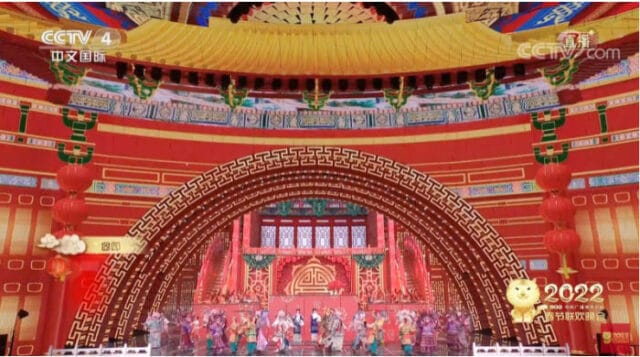
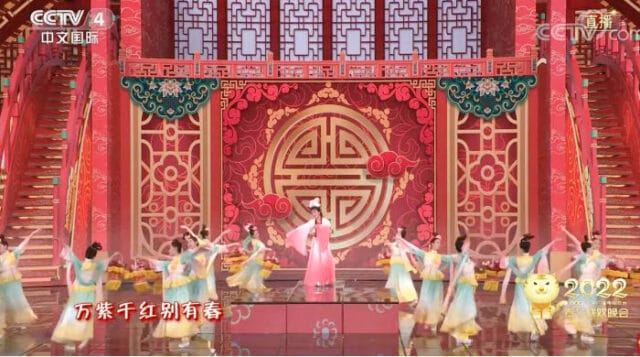
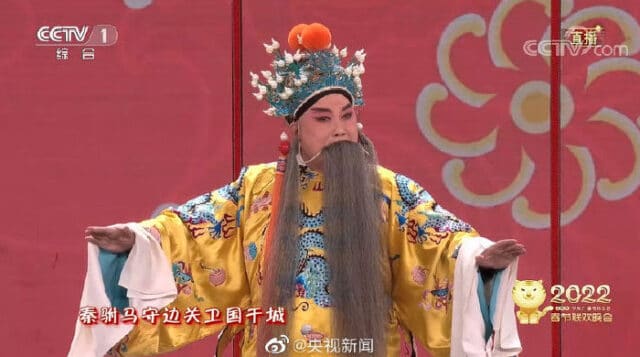
Link to this performance here.
——–
About that Sweater..
Jan 31 21:47
The sweater worn in the ‘debt dodger’ comic skit earlier tonight might have looked cheap, it’s actually $260! Gala viewers who liked the sweater can buy it online straight away.

——–
Grabbing Red Envelopes with JD
Jan 31 21:48
After the Gala partnered with Tencent, Kuaishou, and Baidu in previous years, they’ve now partnered up with e-commerce giant JD.com. Throughout the show, you’ll see various ‘media moments’ during which viewers can ‘catch’ red envelopes.

Actually, the Gala became especially linked to social media it first featured this kind of exchange of ‘hongbao’, red envelopes with money, which is a Chinese New Year’s tradition. In 2015, for the first time, viewers were able to receive virtual ‘hongbao’ as part of a cooperation between CCTV and WeChat. WeChat users shook their phones 11 billion times that night in order to ‘grab’ the money. These kinds of campaigns drew in much more young viewers – the Gala was previously viewed as something for older audiences – although it still might be, social media has helped get the younger viewers involved, too.
——–
“Sending Out Red Envelopes”
Jan 31 21:57
This is another comical sketch, titled Sending Out Red Envelopes (发红包) featuring some well-known comedians including Jia Bing.
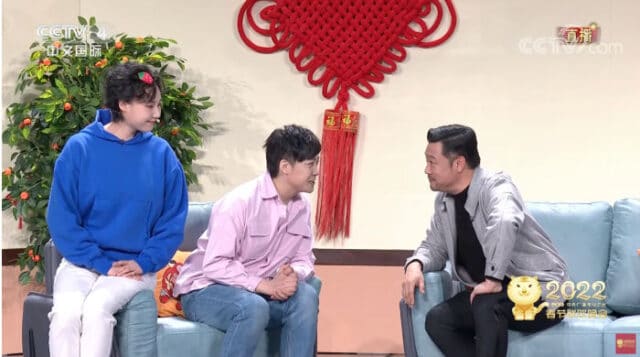
This skit is another one focused on money: “You’d almost think that the director still needs to get his money back from someone,” some Weibo users are joking, since money seems to come up a lot as a theme in tonight’s comedy.
——–
Happy Vibes
Jan 31 22:09
Next up, there are some happy vibes with Da Zhangwei (大张伟) and Wang Mian (王勉) in this “music talk show” (“音乐脱口秀”) segment.
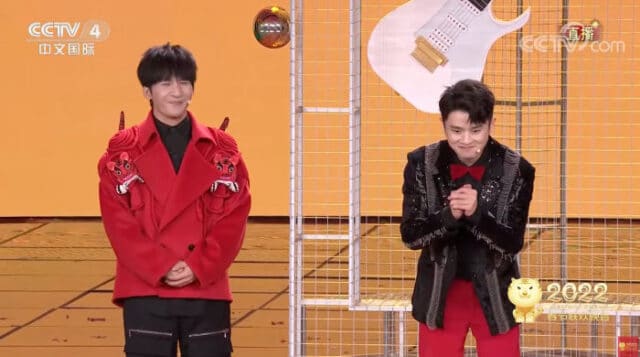
You might know Da Zhangwei as ‘Wowkie Zhang’ from the Sunshine Rainbow White Pony song. Attention was drawn to the song in the West when internet users thought that the chorus of the song, where Wowkie Zhang repeats the lyrics “nèi nèi ge nèi nèi nèi ge nèi ge nèi nèi,” was racist. But ‘nèi ge‘ is actually a filler word in Chinese (like ‘like’).
Link to this performance here.
——–
Magic Act
Jan 31 22:21
Usually, you’d expect magic performances to come a bit later in the show, but here we are with Chinese magician Daly Tang (邓男子). We’re halfway through the show.
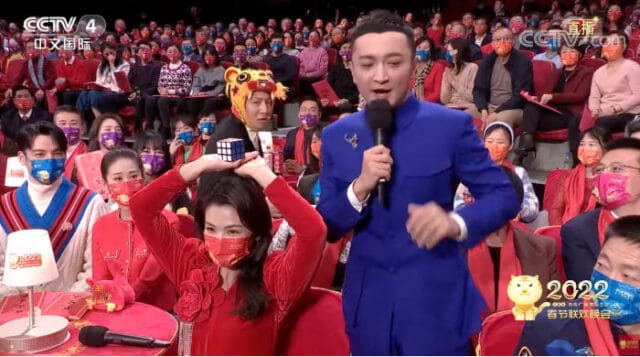
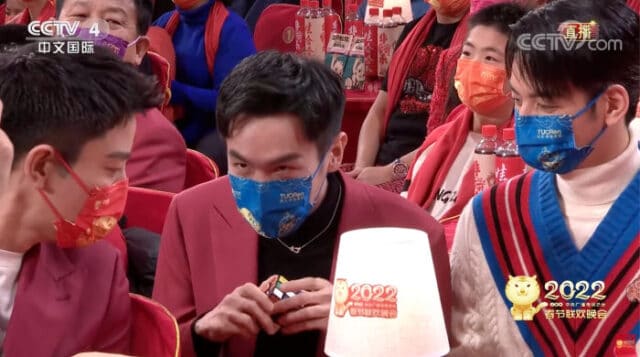
This act is not received well on social media, with many saying this can’t even be called magic. Chinese actress being used as a ‘prop’ for the act is trending at this time.
Link to this performance here.
——–
乳虎啸春
Jan 31 22:25
There are martial arts at the festival every year, but this performance is a bit special since it combines comedy and martial arts and also is performed by many younger performers from the Henan Shaolin Tugou School of Martial Arts.
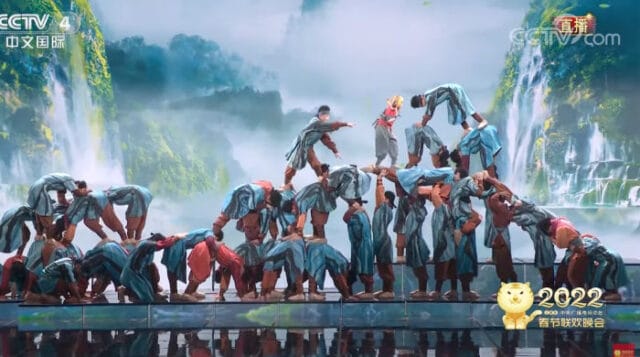
It is also a special performance because it combines martial arts with humor, whereas these kinds of performances are usually more serious.
According to one of the coaches of the children, the students practiced their facial expressions in the mirror every day as part of their homework. They also looked at film and television materials to learn from.
Link to this performance on YouTube here.
——–
“Happy Dialect”
Jan 31 22:39
This ‘crosstalk’ performance features xiangsheng actors Jiang Kun and Dai Zhicheng. Xiangsheng (相声) or crosstalk is a traditional Chinese comedic performance that involves a dialogue between two performers, using rich language and many puns.
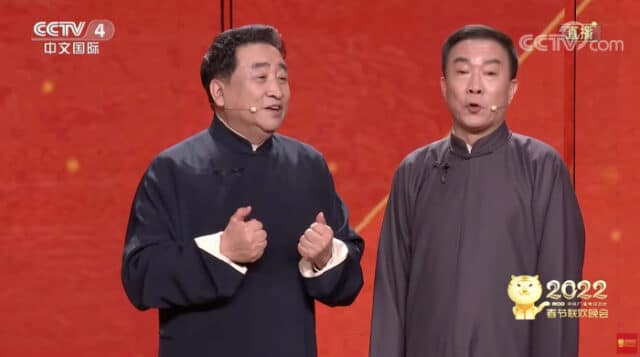
Meanwhile, presenter Sa Beining is going viral for his peculiar role in the magic act.

Link to this performance here.
——–
“Star Dreams”
Jan 31 22:45
Every year, there’s always one song dedicated to children and it’s often all over the place. In the past, we’ve seen dancing panda’s and dogs, flowers, and even swinging broccoli on stage. Here we see the Air Force Blue Sky Children’s Art Troupe on stage together with Zhao Yixi (赵芸熙) in this beautiful space-themed performance.


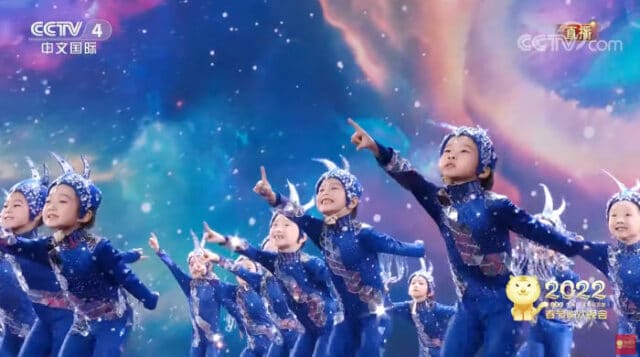
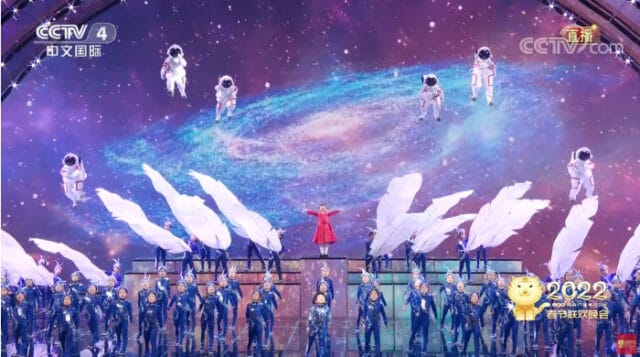
The kids’ performance “Star Dreams” also contained a special surprise: the little girl showing up at the end is actually the little daughter of female Chinese astronaut Wang Yaping, who is now on the 6-month Shenzhou-13 mission. She asked her mum to bring her back a star.
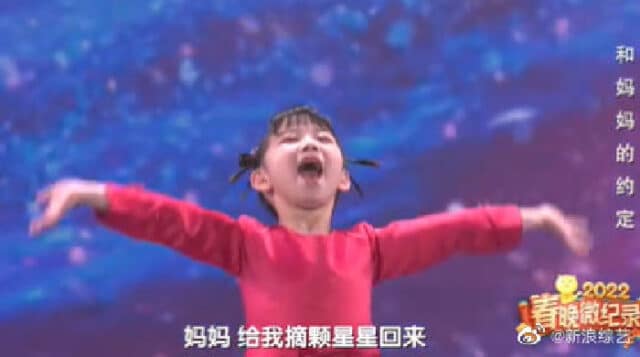
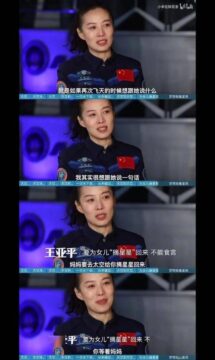
Link to this performance on YouTube here.
——–
Yunnan Group Dance 摆出一个春天
Jan 31 22:48
This performance showcases the traditional folk dances from Lancang Lahu Autonomous County, located in the southwestern part of Yunnan province (not too far from the Myanmar border).
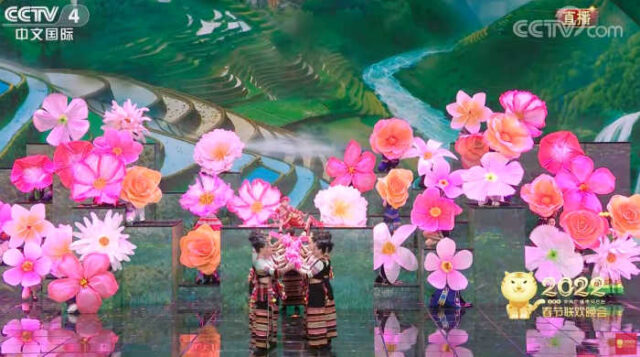
Link to this performance on YouTube here.
——–
“Rest Area” Outside of the Hospital
Jan 31 23:00
Another comical skit, titled ‘Rest Area Story’ (休息区的故事), is performed by Guo Donglin (郭冬临), Shao Feng (邵峰), Han Yunyun (韩云云), Huang Yang (黄杨), Jiang Lilin (姜力琳), Zhang Dabao (张大宝).
Guo Donglin is notable for performing xiangsheng and sketch comedy and has appeared at the Gala for many years.

In this performance, we see a couple, who are both working on the frontlines of the epidemic, arguing together.


"Mask-wearing me when I say hi to my friends but they don't recognize me" pic.twitter.com/JmJiZpuWwT
— Manya Koetse (@manyapan) January 31, 2022
Link to this performance on YouTube here.
——–
Sanxingdui Relics Ceremony and Dance
Jan 31 23:14
Chinese director Zhang Guoli is coming on stage now for this special ceremony that is all about the relics that were unearthed in southwest China earlier in 2021. A gold mask dating back over 3,000 years was among hundreds of relics uncovered from a series of sacrificial pits in southwest China. The finds were made at Sanxingdui, a 4.6-square-mile archeological site outside Chengdu.
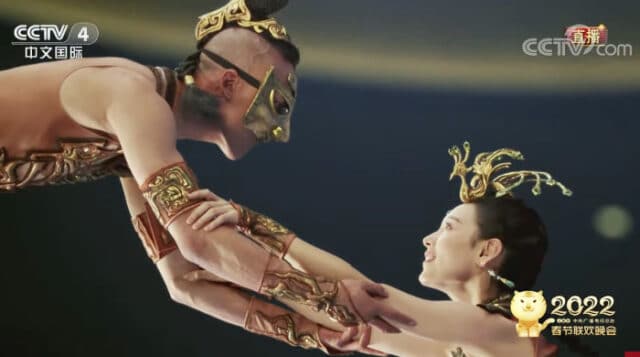
Zhu Fengwei (朱凤伟) and Wang Xi (王西) perform this creative dance performance titled Golden Mask, of course referring to the special artifact found at Sanxingdui.
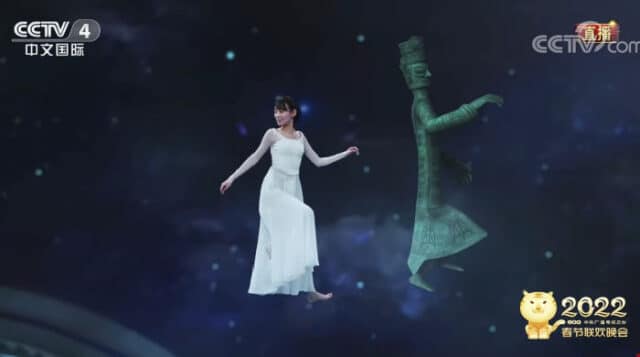
Link to this performance on YouTube here.
——–
ShaLaLaLa Song
Jan 31 23:17
Canto-pop is here! The singers performing this Shalalala song are all established names from Hong Kong. There’s Alan Tan, a big name in the Cantopop scene of the 1980s. There’s Kenny Bee who has been in the entertainment industry for at least three decades. We also see Bennett Pang, Anthony Chan, and Bingo Tso.
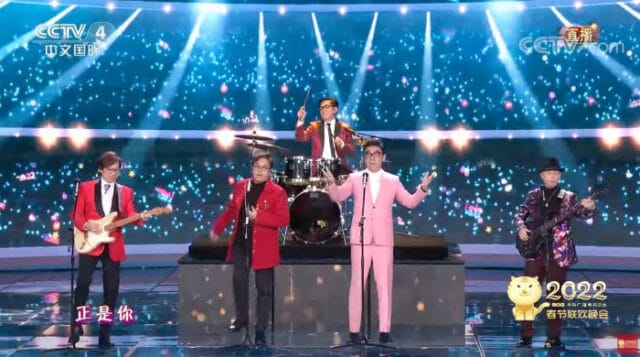
Together, these artists once were in the Hong Kong English pop band The Wynners, which became one of the most popular teen idol groups in Hong Kong during the 1970s.
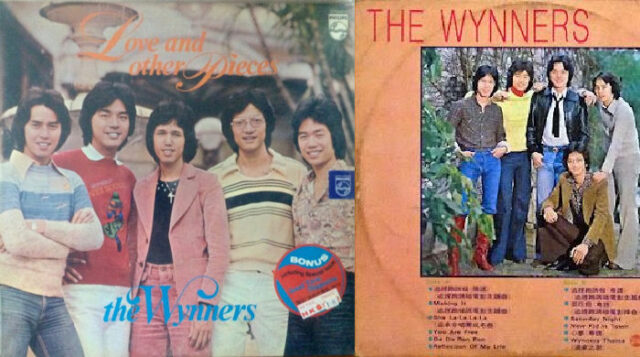
Link to this performance on YouTube here.
——–
True Love Dance
Jan 31 23:22
The China Acrobatic Troupe is on stage to perform the True Love Dance (真爱起舞). Singing are Chinese actors and singers Ren Jialun (任嘉伦), Roy Wang (王源), Victoria Song (宋茜), and Jike Junyi (吉克隽逸).
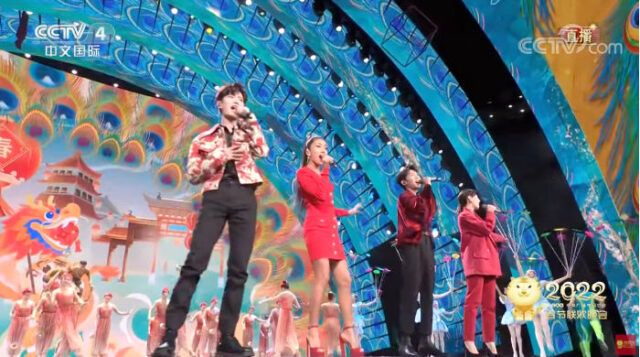
Link to this performance on YouTube here.
——–
Another Xiangsheng
Jan 31 23:33
This xiangsheng or ‘crosstalk’ performance is by Lu Xin and Yu Hao. Crosstalk usually involves two actors with one being the “joker” and the other being the “teaser,” it is all about word jokes and playing with rhythm and language.
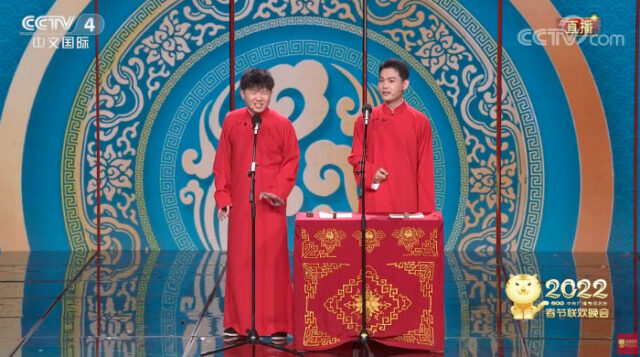
Meanwhile, on Weibo, many netizens are complaining that they don’t find the language performances as funny as before and that they are missing the older performers they grew up seeing on tv.
——–
You are the Gift of My Life
Jan 31 23:38
This song is sung by the renowned Chinese singer and songwriter Liu Huan (刘欢), who is famous for his work within China’s pop music industry. Outside of China, is also known for performing at the 2008 Olympics Ceremony, joined by Sarah Brightman to sing the official song You and Me. Liu actually has a small Olympic pin on his hat as a nod to the Beijing 2008 Olympics.
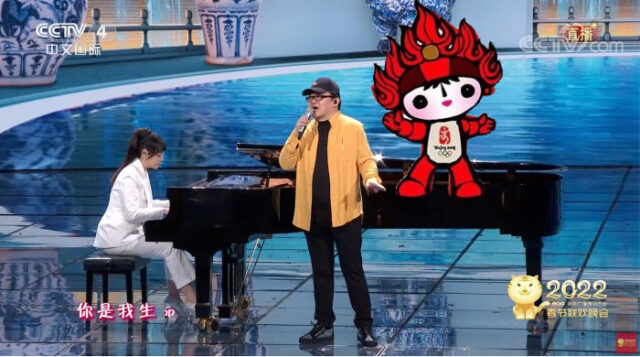
Liu Huan is praised for being down-to-earth, as he's singing at the Gala wearing casual clothes (a pin on his cap is a nod to the 2008 Olympics!) and he didn't even buy a new jacket for the occasion – some Weibo users found this older pic of him wearing the same pic.twitter.com/t5LyjmYoVH
— Manya Koetse (@manyapan) January 31, 2022
Link to this performance on YouTube here.
——–
Our Era
Jan 31 23:40
The song Our Era (我们的时代) is performed by Zhang Ye (张也) and Lü Jihong (吕继宏) who have often sung together at earlier Spring Festivals, mostly singing patriotic songs bringing an ode to China, Chinese people, and China’s landscapes.
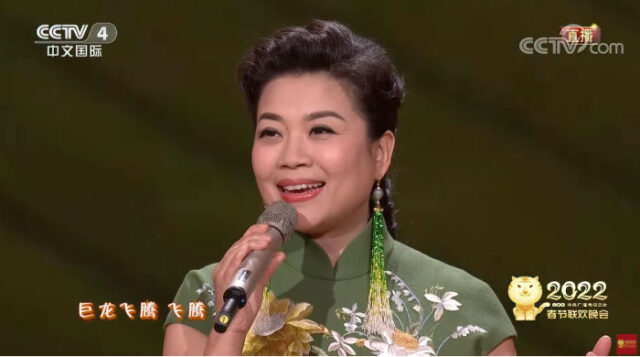
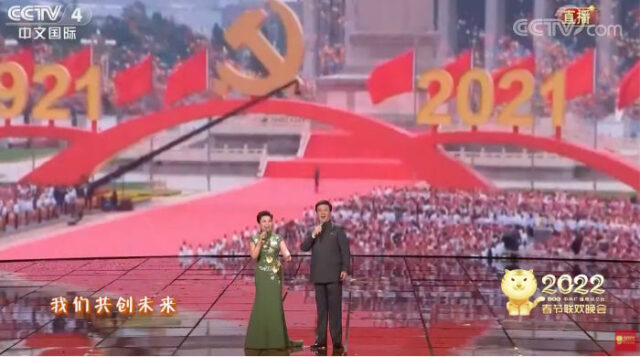

Link to this performance on YouTube here.
——–
Special Segment
Jan 31 23:43
Like every year, this is the part of the show where some ‘exemplary persons’ get honored for their accomplishments. This special segment pays a tribute to recipients of the July 1st Medal, the Party’s highest honor, recognizing exceptional service and contributions to the Party and the country.
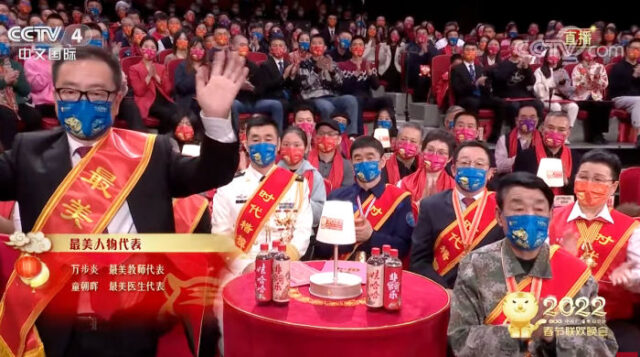
——–
Love Together
Jan 31 23:46
We suddenly find ourselves immersed in an underwater world together with Chinese singer-songwriter Li Ronghao and Taiwanese singer Angela Zhang for the song Love Together (爱在一起).
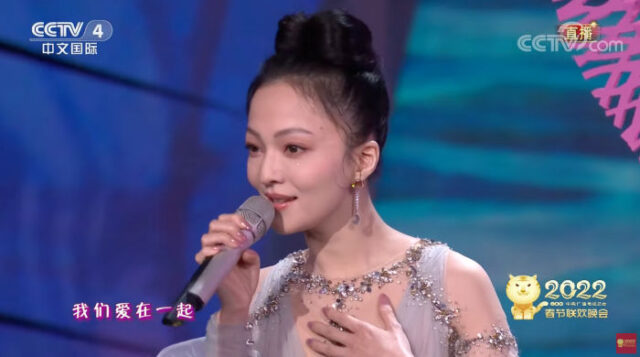
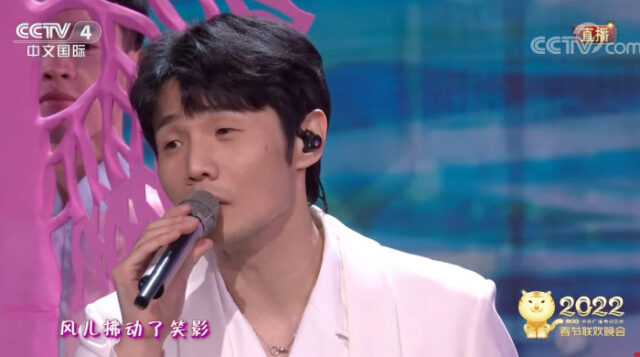
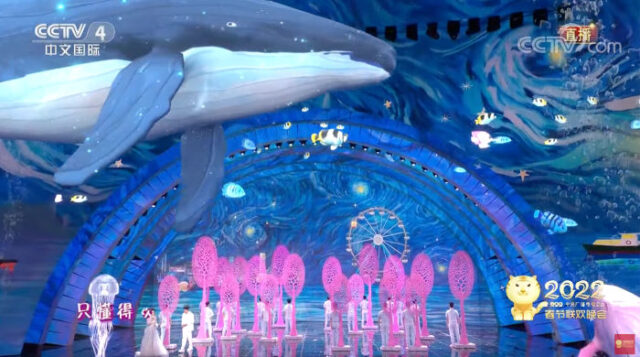
Link to this performance on YouTube here.
——–
Yellow River, Yangtze River
Jan 31 23:52
Mainland China, HK, Macau, and Taiwan are all represented on stage for this song!
This song (黄河 长江) is performed by Chinese top actor and singer Chen Kun (陈坤 , 1979), who is also known as Aloys Chen. Together singing with him are Taiwanese singer Jam Hsiao and Hong Kong rapper/singer/multi-talent Jackson Wang. From Macao there’s the musical artist Sean Pang (Pang Veng-Sam/彭永琛).
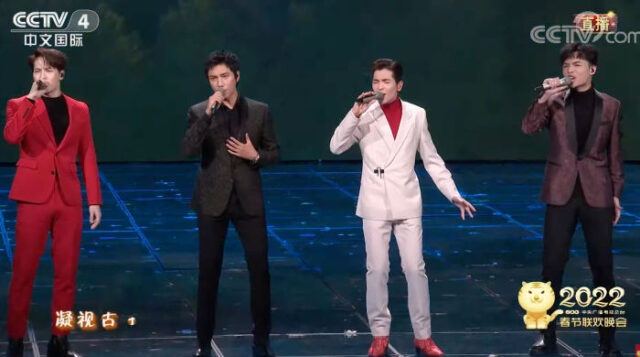
Link to this performance on YouTube here.
——–
The Bells of Spring
Jan 31 23:55
The Bells of Spring (春天的钟声) is a song performed by Gala veteran Sun Nan and the singer Tan Weiwei.
Sun Nan (孙楠) is a famous Chinese Mandopop singer who performed at the Gala multiple times over the past year, including the iconic 2016 performance where he danced together with 540 robots.
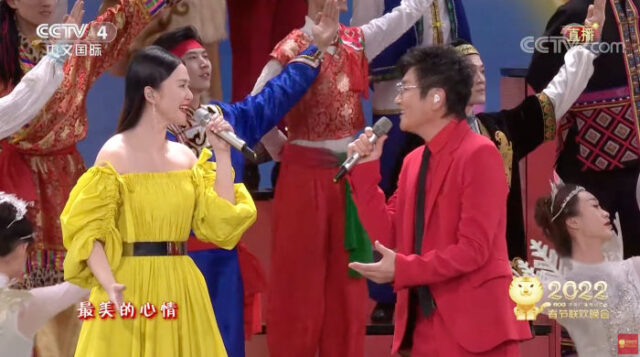
Tan Weiwei (谭维维), also known as Sitar Tan, is a singer from Sichuan who rose to fame when she became a runner-up in the Super Girl talent show. In 2020, she released a noteworthy album titled 3811 which focused on the struggles women in China are facing, with each of the 11 songs on the album telling stories of women from diverse backgrounds.
Link to this performance on YouTube here.
——–
Twelve O’Clock Moment
Jan 31 0:00
Countdown!
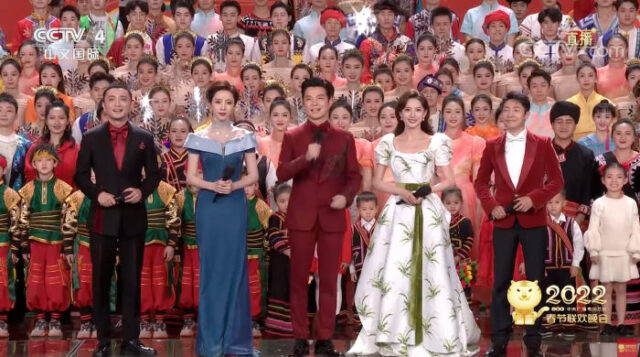
It’s twelve o’clock. Happy New Year, everybody!

This special moment is celebrated together with Chinese astronauts Zhai Zhigang, Wang Yaping, and Ye Guangfu. The three were sent into China’s space station aboard the Shenzhou-13 spaceship on October 16, 2021, for a six-month stay – the longest ever in-orbit duration for ‘taikonauts.’
——–
Winter Olympics Special
Feb 1 00:09
We just saw Ice and Snow Twinkling in the Chinese Year under the guidance of the renowned conductor Chen Xieyang, who is also Honorary Music Director of Shanghai Symphony Orchestra.
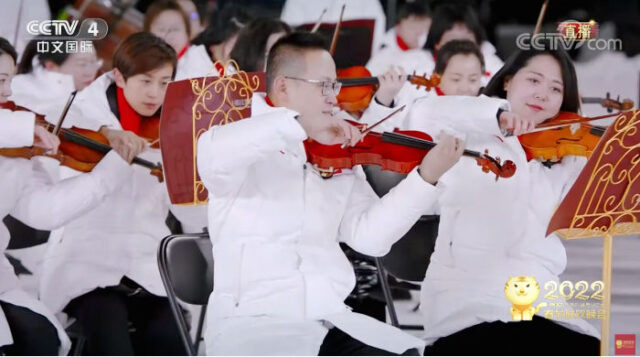
Following were some words from International Olympic Committee (IOC) President Thomas Bach. Last week, the Olympic chief met face-to-face with Xi Jinping as China is getting ready to host the Winter Games.
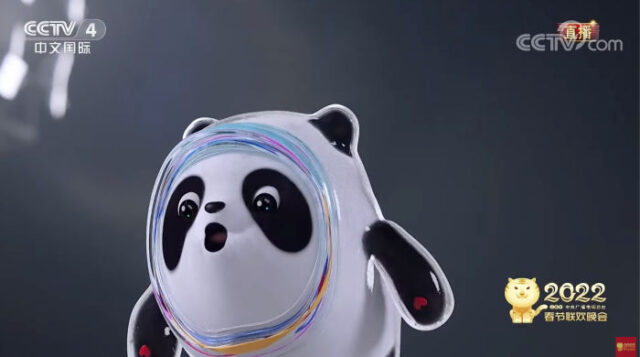
Then this is the official Olympic song Light Up the Dream (点亮梦) performed by baritone Liao Changyong and Hongkong pop diva Coco Lee. On stage with them are 19 foreign hosts of CGTN.
Light Up Your Dreams was released in September 2021 by the Beijing Winter Olympic Organizing Committee as a song meant to communicate positivity and hope (“There’s a miracle waiting for you after the storm”).
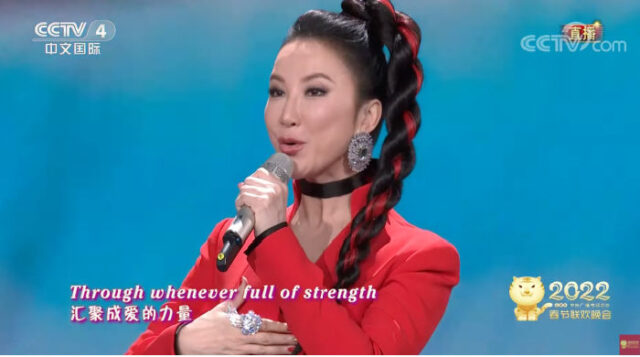
Also performing: China Disabled People’s Performing Art Troupe.
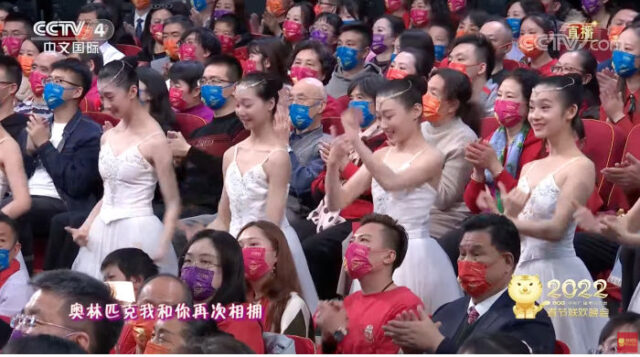
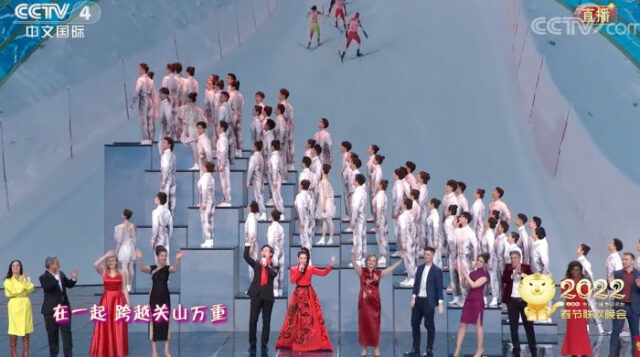
Link to this performance on YouTube here.
——–
Online criticism
Feb 1 00:13
Some online criticism on an earlier short play performed tonight about the hospital staff couple arguing about a spot to go abroad. The husband told the wife not to go because she is female. The online doctor network 丁香园 is now pointing out it’s sexist to say females should not go abroad as people “would be all focusing on how pretty she is instead of getting medical help.”
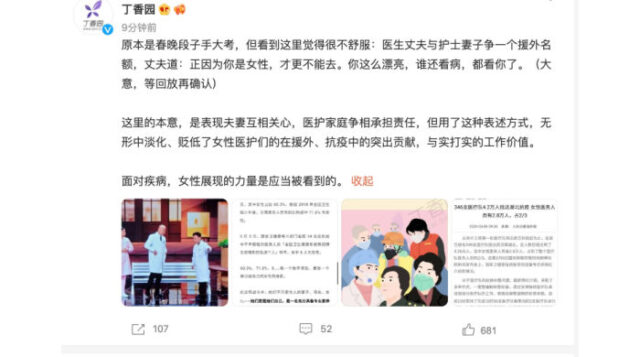
——–
Hotpot Sonata!
Feb 1 00:20
After the Song of the Land we have now switched to Hotpot Sonata (火锅奏鸣曲).
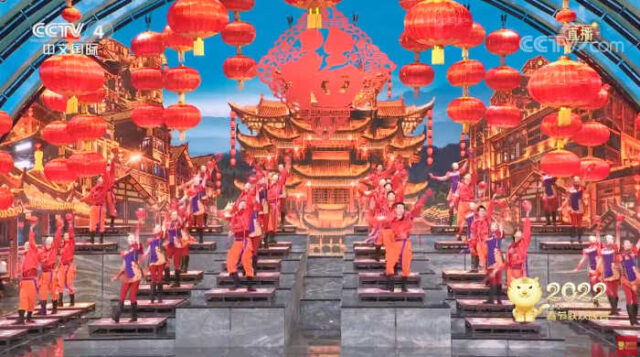
This song is an ode to hotpot! And we love hotpot!
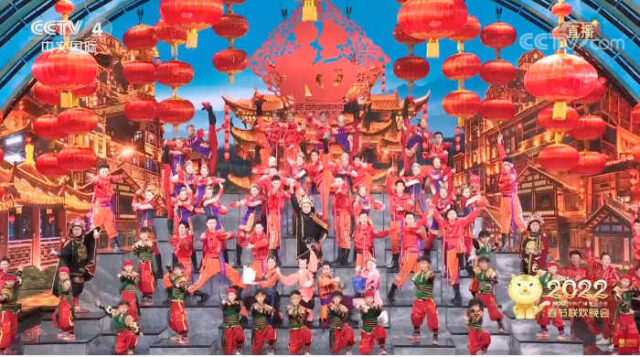
The performance, among others, is by Chongqing Song and Dance Troupe.
Link to this performance on YouTube here.
——–
Creative music, dance, poetry and painting “Reminiscence of the South”
Feb 1 00:23
This song is called Remembering the South (忆江南) and is performed by a male group of older and younger performers, including the 68-year-old Chinese mainland actors Pu Cunxin(濮存昕, 68 years old), Feng Yuanzheng (冯远征, 59 years old), Ding Zhi-Cheng (丁志诚, 58 years old), and the Taiwanese actor Li-Chun Lee (李立群, 69 years old).
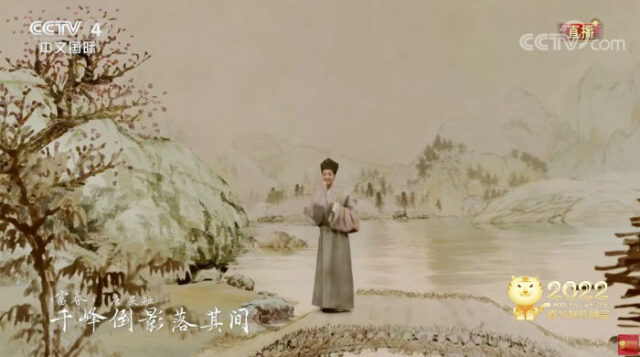
Among the younger singers (1980s/1990s), there’s Ayanga (阿云嘎), Chinese musical theater actor, singer and songwriter of Mongol ethnicity; Taiwanese Mandopop singer Aska Yang (杨宗纬), Chinese singer Shawn Zheng aka Zheng Qiyuan (郑棋元) and the Chinese operatic tenor Cai Chengyu(蔡程昱).
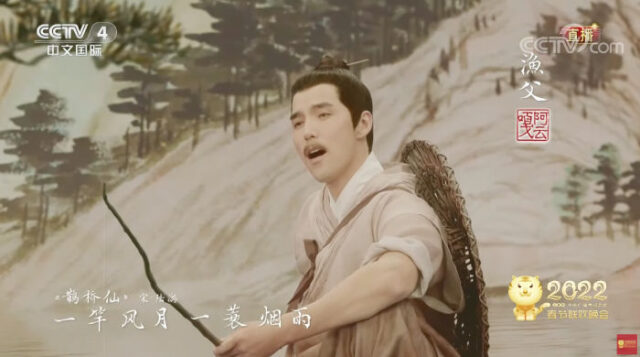
Many on social media find this performance so beautiful that they wonder why it was scheduled so late in the evening.
Link to this performance on YouTube here.
——–
Happy Hour
Feb 1 00:26
Chinese actor Zhu Yilong (朱一龙, 1988) is on stage singing the song Happy Hour (欢乐时光). It is not the first time for the Beijing Film Academy graduate to take part in the show. Last year, he performed together with Jackie Chan in one of the most anticipated acts of the night, which was a performance dedicated to all the health workers during the epidemic.
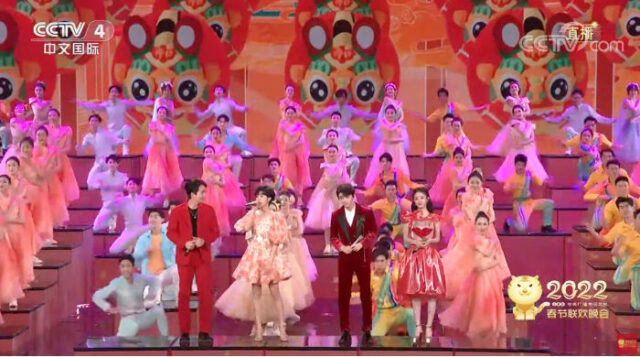
With Zhu there is the “queen of TV ratings”, Chinese actress Zhao Liying (赵丽颖), there’s TFBoys leader Karry Wang aka Wang Junkai (王俊凯), and Yisa Yu aka Yu Kewei (郁可唯).
Dance by Jilin City Song and Dance Troupe, China Post Art Troupe, Shandong Arts Institute, Zhongnan University of Nationalities School of Music and Dance, and the Beijing Modern Music Training Institute.
Link to this performance on YouTube here.
——–
Song “Unforgettable Tonight”
Feb 1 00:23
As always, the last song of tonight is Unforgettable Night (难忘今宵), the traditional closing song of the Spring Festival. The song was composed in 1984 when CCTV was preparing for its second Spring Festival Gala. Chief director Huang Yihe invited Qiao Yu and Wang Ming to write a closing song for the Gala in a simple yet popular style. The lyrics are by Qiao Yu (乔羽), the music is by Wang Ming (王酩).
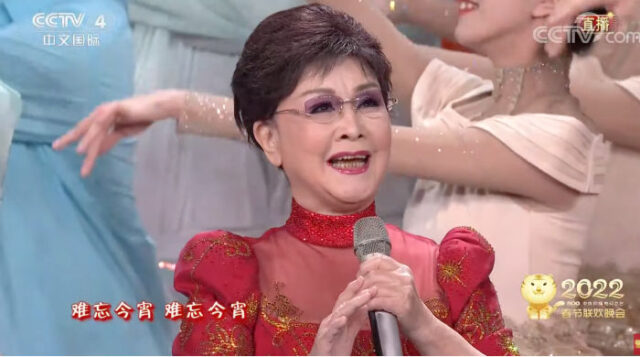
Every year, the song is sung by Li Guyi (李谷一), who became famous with the song Homeland Love (乡恋) around the time of China’s Reform and Opening Up – the singer and her songs are nostalgic for many viewers. Li Guyi also appeared at the very first version of the Gala in 1983 and became the singer that sang the most at the event. She is singing together with Yang Hongji (杨洪基), Huo Yong (霍勇), and Yi Liyuan (伊丽媛).
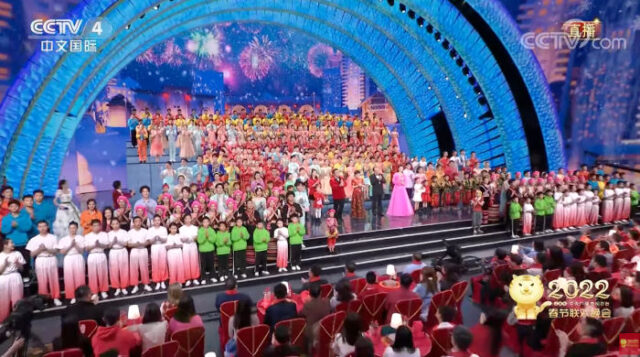
With her on stage are all performers out tonight. It’s a wrap! Thank you for joining us and cheers to the Year of the Tiger.
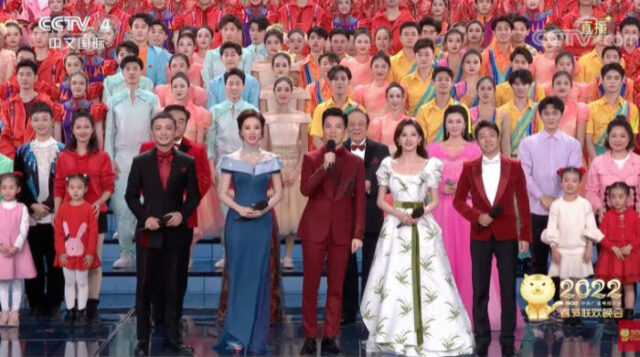
Link to this performance on YouTube here.
By Manya Koetse, together with Miranda Barnes
1 For more on the political and socio-cultural meaning of the Gala, see Gao Yuan, 2012, “Construction of National Identity Through Media Ritual: A Case Study of the CCTV Spring Festival Gala,” Master’s Thesis, Uppsala University, Media & Communication Studies;
Yuan Yan, 2017, “Casting an ‘Outsider’ in the Ritual Center: Two Decades of Performances of ‘Rural Migrants’ in CCTV’s Spring Festival Gala,” Global Media and China 2 (2): 169-182.
Spotted a mistake or want to add something? Please let us know in comments below or email us. First-time commenters, please be patient – we will have to manually approve your comment before it appears.
©2022 Whatsonweibo. All rights reserved. Do not reproduce our content without permission – you can contact us at info@whatsonweibo.com.
Stories that are authored by the What's on Weibo Team are the stories that multiple authors contributed to. Please check the names at the end of the articles to see who the authors are.

Also Read
China Arts & Entertainment
Singing Competition or Patriotic Fight? Hunan TV’s ‘Singer 2024’ Stirs Nationalistic Sentiments
“I’m in Zibo eating barbecue, I really don’t feel like listening to Alicia Keys.” Hunan TV’s ‘Singer 2024’ has set off a new wave of national pride in China’s music and performers.
Published
2 months agoon
May 17, 2024By
Ruixin Zhang
Besides memes and jokes, Hunan TV’s ‘Singer 2024’ has set off a new wave of national pride in China’s music and performers on Chinese social media.
In May, while the whole of Europe was gripped by the Eurovision Song Contest frenzy, Chinese audiences were eagerly anticipating the return of their own beloved singing competition, Singer 2024 (@湖南卫视歌手), formerly known as I Am a Singer (我是歌手).
The show, introduced from South Korea’s MBC Television and popular in China since 2013, only features professional singers who have already made a name for themselves.
Rather than watching unknown aspiring singers who are hoping to be discovered in many singing competitions, such as Sing! China, Singer 2024 gives audiences a show filled with professional and often stunning show performances by established names in the entertainment industry.
Since 2013, renowned singers from China and abroad have appeared on the show, including Chinese vocalist Tan Jing (谭晶), British pop singer Jessie J, and the late Hong Kong pop diva Coco Lee. However, no season managed to create as many waves as the 2024 season did, dominating all social media trending topics overnight.
So, what exactly happened?
COMPETING WITH FOREIGNERS
“The difference between the Grammys and the Strawberry Musical Festival”
In early May, the pre-show promotion of Singer 2024 was already buzzing on Chinese social media after a list of featured singers appeared on Weibo, including big names such as American singer-songwriter Bruno Mars, Korean-New Zealand singer Rosé from Blackpink, and Japanese diva LiSA.
Although Singer previously had many foreign singers on the show, this international celebrity lineup still caused a stir.
On the day of the first episode, only two foreign singers were announced to appear on the show: young Moroccan-Canadian singer Faouzia and the Grammy-nominated American singer-songwriter Chanté Moore. The other contestants were all Chinese singers who are already well-known among Chinese audiences. Because many people were unfamiliar with the two foreign singers, they joked that the winner of this season was already set in stone; surely it would be the famous Chinese singer Na Ying (那英), known for her beautiful voice.
However, that first episode surprised everyone as the two foreign singers, Faouzia and Chanté Moore, showed outstanding vocal skills. This not only startled many viewers but also made the Chinese contestants uneasy. Several experienced Chinese singers apparently were so unnerved after watching Faouzia and Chanté Moore’s performance that their voices trembled when singing.

Since the show was broadcast live – without post-production editing or autotune – audiences got to hear the actual vocal capabilities and see performers’ genuine reactions. It seemed undeniable that the foreign contestants did much better in terms of vocals and stage presence than the Chinese ones. Some online commenters even said that the gap between Chinese and foreign singers’ levels was like “the difference between the Grammys and the Strawberry Musical Festival” [a local Chinese music festival].
Chinese online influencer Yongkai (@陈咏开165) shared screenshots of Chanté Moore’s backstage reactions during the show. The American celebrity seemed puzzled when hearing the somewhat underwhelming performance by Chinese singer Yang Chenglin (楊丞琳), and she appeared much more positive when Na Ying sang.

This noteworthy scene, coupled with Chanté’s comments during an interview saying that she thought the Chinese production team had invited her on the show to be a judge, turned the entire show into a display of foreign singers outshining the Chinese contestants.
By the end of the first episode, Chanté Moore and Faouzia unsurprisingly ranked first and second, with Na Ying in third place.

After the show, some online commenters jokingly pointed out that Na Ying, being of Manchu descent like the rulers of China during the Qing Dynasty, showed some similarities to Empress Dowager Cixi’s defiance against Western colonizers in the way she “single-handedly took up against on foreigners” on the show.
They humorously turned Na Ying’s expressions into memes resembling Empress Dowager Cixi from an old Chinese TV show, with captions like “I want the foreigners dead” (“我要洋人死”).

Others suggested finding better Chinese singers for the show who could compete with Faouzia and Moore.
“SINGING WELL” CULTURALLY COLONIZED?
“I’m in Zibo eating BBQ, I really don’t want to listen to Alicia Keys.”
Initially, discussions about the show were light-hearted and humorous, until some netizens who couldn’t appreciate the jokes began to dampen the mood and made online discussions more serious.
Zou Xiaoying (@邹小樱), a music critic with nearly two million followers, posted on social media after the show, stating that he would have never voted for Chanté Moore or Faouzia. Not only did Zou question their vocal talent, he also wondered if the aesthetic of Chinese listeners had been influenced by Western music taste to such an extent that it has been “culturally colonized” (“文化殖民”). Meanwhile, he praised the members of Beijing rock band Second Hand Rose as “national heroes” (“民族英雄”).
He wrote:
If I had three votes for the first episode of “Singer 2024,” I’d vote for Second Hand Rose, Na Ying, and Silence Wang [note: Chinese singer-songwriter and record producer Wang Sushuang 汪苏泷]. The reason I wouldn’t vote for Chanté Moore or Faouzia is because — do they actually sing so well?
Has our definition of “singing well” perhaps been colonized? Just as our modern-day use of Chinese has little to do with our classical Chinese poems, with the foundation of modern Chinese actually being translations from the 20th century, is this also a form of ‘cultural colonization’?
You must think I’m talking nonsense again. But when I listen to Chanté Moore singing “If I Ain’t Got You,” I find it too boring. I know her singing is “good,” but this “good” has nothing to do with me. If, for Chinese listeners, Chanté Moore’s “good” is the standard, then is that what we in the music industry should be working towards? Isn’t that funny? When you open QQ Music or NetEase Cloud Music, and it recommends these songs to you every day, won’t you be convinced to practice again?
Of course, I know Chanté Moore is in good shape, very relaxed. Actually all of the Chinese singers tonight were very nervous. Yang Chenglin (杨丞琳) was nervous, Na Ying was also nervous. Even a seemingly carefree band like Second Hand Rose, if you listened to the introduction of their song, [you’ll find] they were so nervous that Yao Lan, supposedly “China’s No.1 Guitarist”, was so nervous that he hit the wrong note. It was not even a fast-paced solo (…), how nervous could he be? When everyone’s so tense, the confidence of Chanté Moore and Faouzia is indeed something that East Asia can’t match. In East-Asian [entertainment] circles, represented by China/Japan/Korea, our different cultural habits, upbringing, and ethnic characteristics have made it so that we don’t possess these kinds of singing abilities, even including our ways of emotional expression. I don’t know from which season it started with ‘Singer’ – and if it’s some kind of Catfish Effect (鲶鱼效应 ) – that they brought international singers with different cultural backgrounds into the competition. But this isn’t the Olympics, it’s not like Liu Xiang [刘翔, Chinese gold medal hurdler] is going to defeat opponents from the United States or Cuba. “I’m in Zibo eating barbecue, I really don’t feel like Alicia Keys.” (This line is not mine, I stole it from my WeChat friend).
Because of this, I find Second Hand Rose even more rare and precious. It’s just like I used to love asking: If you could only recommend one Chinese band to your foreign friends, which one would you recommend? Some say it’s New Pants (新裤子), some say it’s Omnipotent Youth Society, but my answer will always be Second Hand Rose. ‘The drama of Monkey King is a national treasure,’ its light will always shine. Facing the gunfire of Western powers, Second Hand Rose is standing on the frontline, they are our national heroes. Indeed, the band itself was nervous, (..), but when Chanté Moore goes off like a singing dolphin, we are fortunate to have Second Hand Rose at the frontline; the Chinese sons and daughters are building the Great Wall of Music of flesh and blood.
Because of this, I find Second Hand Rose even more rare and precious. It’s just like I used to love asking: If you could only recommend one Chinese band to your foreign friends, which one would you recommend? Some say it’s New Pants (新裤子), some say it’s Omnipotent Youth Society, but my answer will always be Second Hand Rose. ‘The drama of Monkey King is a national treasure,’ its light will always shine. Facing the gunfire of Western powers, Second Hand Rose is standing on the frontline, they are our national heroes. Indeed, the band itself was nervous, (..), but when Chanté Moore goes off like a singing dolphin, we are fortunate to have Second Hand Rose at the frontline; the Chinese sons and daughters are building the Great Wall of Music of flesh and blood.
Anyway, no matter if they’re strong or not, I would never vote for the foreigner.
The comment about ‘I’m in Zibo eating barbecue, I really don’t feel like [listening to] Alicia Keys’ refers to the craze surrounding China’s ‘BBQ town’ Zibo. In Zibo, Chinese visitors like to sing, drink beer, and enjoy food together; it’s a simple and modest way of appreciating life and music, which contrasts with slick and smooth American or foreign styles of performing and singing.
Whether Zou’s criticism was for attention or genuine sentiment, it shifted the focus of the discussion from music to patriotism.
CHINESE SINGERS WITH MILITARISTIC UNDERTONES
“I volunteer to join the battle”
Amidst all this, some netizens, easily swayed by nationalist sentiments, began to seek help from the “national team” (国家队) of singers — musicians employed by national-level arts troupes — to “bring glory to the nation” and teach the foreigners a lesson. Some even questioned the intentions of the Singer 2024 TV show in inviting foreign singers to participate.
On May 12th, renowned Chinese singer and philanthropist Han Hong (韩红) posted on Weibo, fueling a wave of sentiment and support. In her post, Han Hong declared, “I am Chinese singer Han Hong, and I volunteer to join the battle,” tagging the production team of the TV show. Her invitation to join the battle quickly went viral.

Han Hong meme: “Who called for me?”
Han Hong has significant influence in the Chinese music industry and society as a whole. Her usual serious demeanor and avoidance of internet pop culture made netizens unsure whether she was joking or serious. Nevertheless, regardless of her intentions, a group of well-known singers began to volunteer via Weibo, emphasizing their identity as “Chinese singers” and using phrases with strong militaristic undertones like “fighting for the country” and “answering the call.”
Although many enjoyed this new wave of national pride in Chinese music and performers, some netizens criticized the trend of transforming an entertainment show into a nationalistic competition.
Film critic He Xiaoqin (何小沁) stated, “It’s okay to take the Qing-Dynasty-fighting-foreigners comparison as a joke, but taking it too seriously in today’s context is absurd.”
Others expressed fatigue with how quickly topics on Chinese internet platforms escalate to patriotic sentiments. To bring the focus back to entertainment, they turned “I volunteer to join the battle” (#我请战#) into a new internet catchphrase.
In response, the production team of Singer 2024 released a statement on Weibo, thanking all the singers for their self-recommendations. They emphasized the show’s competitive structure but clarified that “winning” is just one part of a singer’s journey..but that the love of music goes beyond all in connecting people, no matter where they’re from.
By Ruixin Zhang, edited with further input by Manya Koetse
Independently reporting China trends for over a decade. Like what we do? Support us and get the story behind the hashtag by subscribing:
Spotted a mistake or want to add something? Please let us know in comments below or email us. First-time commenters, please be patient – we will have to manually approve your comment before it appears.
©2024 Whatsonweibo. All rights reserved. Do not reproduce our content without permission – you can contact us at info@whatsonweibo.com.
China Arts & Entertainment
“Old Bull Eating Young Grass”: 86-Year-Old Chinese Painter Fan Zeng Marries 36-Year-Old Xu Meng
Online reactions to the news of Fan’s marriage to Xu Meng, his fourth wife, reveal that the renowned artist is not particularly well-liked among Chinese netizens.
Published
3 months agoon
April 18, 2024
The recent marriage announcement of the renowned Chinese calligrapher/painter Fan Zeng and Xu Meng, a Beijing TV presenter 50 years his junior, has sparked online discussions about the life and work of the esteemed Chinese artist. Some netizens think Fan lacks the integrity expected of a Chinese scholar-artist.
Recently, the marriage of a 86-year-old Chinese painter to his bride, who is half a century younger, has stirred conversations on Chinese social media.
The story revolves around renowned Chinese artist, calligrapher, and scholar Fan Zeng (范曾, 1938) and his new spouse, Xu Meng (徐萌, 1988). On April 10, Fan announced their marriage through an online post accompanied by a picture.
In the picture, Fan is seen working on his announcement in calligraphic form.

Fan Zeng announces his marriage on Chinese social media.
In his writing, Zeng shares that the passing of his late wife, three years ago, left him heartbroken, and a minor stroke also hindered his work. He expresses gratitude for Xu Meng’s care, which he says led to his physical and mental recovery. Zeng concludes by expressing hope for “everlasting harmony” in their marriage.
Fan Zeng is a calligrapher and poet, but he is primarily recognized as a contemporary master of traditional Chinese painting. Growing up in a well-known literary family, his journey in art began at a young age. Fan studied under renowned mentors at the Academy of Fine Arts in Beijing, including Wu Zuoren, Li Keran, Jiang Zhaohe, and Li Kuchan.
Fan gained global acclaim for his simple yet vibrant painting style. He resided in France, showcased his work in numerous exhibitions worldwide, and his pieces were auctioned at Sotheby’s and Christie’s in the 1980s.[1] One of Fan’s works, depicting spirit guardian Zhong Kui (钟馗), was sold for over 6 million yuan (828,000 USD).

Zhong Kui in works by Fan Zeng.
In his later years, Fan Zeng transitioned to academia, serving as a lecturer at Nankai University in Tianjin. At the age of 63, he assumed the role of head of the Nankai University Museum of Antiquities, as well as holding various other positions from doctoral supervisor to honorary dean.
By now, Fan’s work has already become part of China’s twentieth-century art history. Renowned contemporary scholar Qian Zhongshu once remarked that Fan “excelled all in artistic quality, painting people beyond mere physicality.”
A questionable “role model”
Fan’s third wife passed away in 2021. Later, he got to know Xu Meng, a presenter at China Traffic Broadcasting. Allegedly, shortly after they met, he gifted her a Ferrari, sparking the beginning of their relationship.

A photo of Xu and her Hermes Birkin 25 bag has also been making the rounds on social media, fueling rumors that she is only in it for the money (the bag costs more than 180,000 yuan / nearly 25,000 USD).
On Weibo, reactions to the news of Fan’s marriage to Xu Meng, his fourth wife, reveal that the renowned artist is not particularly well-liked among netizens. Despite Fan’s reputation as a prominent philanthropist, many perceive his recent marriage as yet another instance of his lack of integrity and shamelessness.

Fan Zeng and Xu Meng. Image via Weibo.
One popular blogger (@好时代见证记录者) sarcastically wrote:
“Warm congratulations to the 86-year-old renowned contemporary erudite scholar and famous calligrapher Fan Zeng, born in 1938, on his marriage to Ms Xu Meng, a 50 years younger 175cm tall woman who is claimed to be China’s number one golden ratio beauty. Mr Fan Zeng really is a role model for us middle-aged greasy men, as it makes us feel much less uncomfortable when we’re pursuing post-90s youngsters as girlfriends and gives us an extra shield! Because if contemporary Confucian scholars [like yourself] are doing this, then we, as the inheritors of Confucian culture, can surely do the same!“
Various people criticize the fact that Xu Meng is essentially just an aide to Fan, as she can often be seen helping him during his work. One commenter wrote: “Couldn’t he have just hired an assistant? There’s no need to turn them into a bed partner.”
Others think it’s strange for a supposedly scholarly man to be so superficial: “He just wants her for her body. And she just wants him for his inheritance.”
“It’s so inappropriate,” others wrote, labeling Fan as “an old bull grazing on young grass” (lǎoniú chī nèncǎo 老牛吃嫩草).
Fan is not the only well-known Chinese scholar to ‘graze on young grass.’ The famous Chinese theoretical physicist Yang Zhenning (杨振宁, 1922), now 101 years old, also shares a 48-year age gap with his wife Weng Fen (翁帆). Fan, who is a friend of Yang’s, previously praised the love between Yang and Weng, suggesting that she kept him youthful.

Older photo posted on social media, showing Fan attending the wedding ceremony of Yang Zhenning and his 48-year-younger partner Weng Fen.
Some speculate that Fan took inspiration from Yang in marrying a significantly younger woman. Others view him as hypocritical, given his expressions of heartbreak over his previous wife’s passing, and how there’s only one true love in his lifetime, only to remarry a few years later.
Many commenters argue that Fan Zeng’s conduct doesn’t align with that of a “true Confucian scholar,” suggesting that he’s undeserving of the praise he receives.
“Mr. Wang from next door”
In online discussions surrounding Fan Zeng’s recent marriage, more reasons emerge as to why people dislike him.
Many netizens perceive him as more of a money-driven businessman rather than an idealistic artist. They label him as arrogant, critique his work, and question why his pieces sell for so much money. Some even allege that the only reason he created a calligraphy painting of his marriage announcement is to profit from it.
Others cast doubt on his status as a Chinese calligraphy ‘grandmaster,’ noting that his calligraphy style is not particularly impressive and may contain typos or errors. His wedding announcement calligraphy appears to blend traditional and simplified characters.

Netizens have pointed out what looks like errors or typos in Fan’s calligraphy.
Another source of dislike stems from his history of disloyalty and his feud with another prominent Chinese painter, Huang Yongyu (黄永玉). Huang, who passed away in 2023, targeted Fan Zeng in some of his satirical paintings, including one titled “When Others Curse Me, I Also Curse Others” (“人骂我,我亦骂人”). He also painted a parrot, meant to mock Fan Zeng’s unoriginality.

Huang Yongyu made various works targeting Fan Zeng.
In retaliation, Fan produced his own works mocking Huang, sparking an infamous rivalry in the Chinese art world. The two allegedly almost had a physical fight when they ran into each other at the Beijing Hotel.

Fan Zeng mocked Huang Yongyu in some of his works.
Fan and Huang were once on good terms though, with Fan studying under Huang at the Central Academy of Fine Arts in Beijing. Through Huang, Fan was introduced to the renowned Chinese novelist Shen Congwen (沈从文, 1902-1988), Huang’s first cousin and lifelong friend. As Shen guided Fan in his studies and connected him with influential figures in China’s cultural circles, their relationship flourished.
However, during the Cultural Revolution, when Shen was accused of being a ‘reactionary,’ Fan Zeng turned against him, even going as far as creating big-character posters to criticize his former mentor.[2] This betrayal not only severed the bond between Shen and Fan but also ended Fan’s friendship with Huang, and it is still remembered by people today.
Fan Zeng’s behavior towards another former mentor, the renowned painter Li Kuchan (李苦禪, 1899-1983), was also controversial. Once Fan gained fame, he made it clear that he no longer respected Li as his teacher. Li later referred to Fan as “a wolf in sheep’s clothes,” and apparently never forgave him. Although the exact details of their falling out remain unclear, some blame Fan for exploiting Li to further his own career.
There are also some online commenters who call Fan Zeng a “Mr Wang from next door” (隔壁老王), a term jokingly used to refer to the untrustworthy neighbor who sleeps with one’s wife. This is mostly because of the history of how Fan Zeng met his third wife.
Fan’s first wife was the Chinese female calligrapher Lin Xiu (林岫), who came from a wealthy family. During this marriage, Fan did not have to worry about money and focused on his artistic endeavours. The two had a son, but the marriage ended in divorce after a decade. Fan’s second wife was fellow painter Bian Biaohua (边宝华), with whom he had a daughter. It seems that Bian loved Fan much more than he loved her.
It is how he met his third wife that remains controversial to this day. Nan Li (楠莉), formerly named Zhang Guiyun (张桂云), was married to performer Xu Zunde (须遵德). Xu was a close friend of Fan, and helped him out when Fan was still poor and trying to get by while living in Beijing’s old city center.
Wanting to support Fan’s artistic talent, Xu let Fan Zeng stay over, supported him financially, and would invite him for meals. Little did he know that while Xu was away to work, Fan enjoyed much more than meals alone; Fan and Xu’s wife engaged in a secret decade-long affair.
When the affair was finally exposed, Xu Zunde divorced his wife. Still, they would use his house to meet and often locked him out. Three years later, Nan Li officially married Fan Zeng. Xu not only lost his wife and friend but also ended up finding his house emptied, his two sons now bearing Fan’s surname.
When Nan Li passed away in 2021, Fan Zeng published an obituary that garnered criticism. Some felt that the entire text was actually more about praising himself than focusing on the life and character of his late wife, with whom he had been married for forty years.

Fan Zeng and his four wives
An ‘old pervert’, a ‘traitor’, a ‘disgrace’—there are a lot of opinions circulating about Fan that have come up this week.
Despite the negativity, a handful of individuals maintain a positive outlook. A former colleague of Xu Meng writes: “If they genuinely like each other, age shouldn’t matter. Here’s to wishing them a joyful marriage.”
By Manya Koetse
[1]Song, Yuwu. 2014. Biographical Dictionary of the People’s Republic of China. United Kingdom: McFarland & Company, 76.
[2]Xu, Jilin. 2024. “Xu Jilin: Are Shen Congwen’s Tears Related to Fan Zeng?” 许纪霖:沈从文的泪与范曾有关系吗? The Paper, April 15. https://www.thepaper.cn/newsDetail_forward_27011031. Accessed April 17, 2024.
Independently reporting China trends for over a decade. Like what we do? Support us and get the story behind the hashtag by subscribing:
Spotted a mistake or want to add something? Please let us know in comments below or email us. First-time commenters, please be patient – we will have to manually approve your comment before it appears.
©2024 Whatsonweibo. All rights reserved. Do not reproduce our content without permission – you can contact us at info@whatsonweibo.com.
Subscribe

Weibo Watch: The Future is Here

“Bye Bye Biden”: Biden’s Many Nicknames in Chinese

Enjoying the ‘Sea’ in Beijing’s Ditan Park

A Triumph for “Comrade Trump”: Chinese Social Media Reactions to Trump Rally Shooting

Weibo Watch: Get Up, Stand Up

The Tragic Story of “Fat Cat”: How a Chinese Gamer’s Suicide Went Viral

“Old Bull Eating Young Grass”: 86-Year-Old Chinese Painter Fan Zeng Marries 36-Year-Old Xu Meng

A Brew of Controversy: Lu Xun and LELECHA’s ‘Smoky’ Oolong Tea

Singing Competition or Patriotic Fight? Hunan TV’s ‘Singer 2024’ Stirs Nationalistic Sentiments

Zara Dress Goes Viral in China for Resemblance to Haidilao Apron

Weibo Watch: The Battle for the Bottom Bed

About the “AI Chatbot Based on Xi Jinping” Story

China’s Intensified Social Media Propaganda: “Taiwan Must Return to Motherland”

Weibo Watch: Telling China’s Stories Wrong

Saying Goodbye to “Uncle Wang”: Wang Wenbin Becomes Chinese Ambassador to Cambodia
Get in touch
Would you like to become a contributor, or do you have any tips or suggestions? Get in touch here!
Popular Reads
-

 China Insight3 months ago
China Insight3 months agoThe Tragic Story of “Fat Cat”: How a Chinese Gamer’s Suicide Went Viral
-

 China Music4 months ago
China Music4 months agoThe Chinese Viral TikTok Song Explained (No, It’s Not About Samsung)
-

 China Digital10 months ago
China Digital10 months agoToo Sexy for Weibo? Online Discussions on the Concept of ‘Cābiān’
-

 China Arts & Entertainment12 months ago
China Arts & Entertainment12 months agoBehind 8 Billion Streams: Who is Dao Lang Cursing in the Chinese Hit Song ‘Luocha Kingdom’?




